January 29, 2021
Happily ever opera
Romance abounds in opera; however, happily-ever-afters can be a bit harder to find. Ahead of Valentine's Day, we're breaking down our list of the top-10 opera couples who actually got their happy ending.
Better late than never: Hanna Glawari and Count Danilo
What's better than a second-chance romance? In Franz Lehár's The Merry Widow, Hanna Glawari and Count Danilo are reunited after years apart. They were separated by Danilo's uncle because she had nothing to her name, back in the day. Though their feelings for each other haven't changed, Danilo initially refuses to court Hanna for her fortune and she refuses to marry him until he says "I love you"–something he claims he will never do....until he does. Everyone is pleased with the match and the couple get their second chance at love.
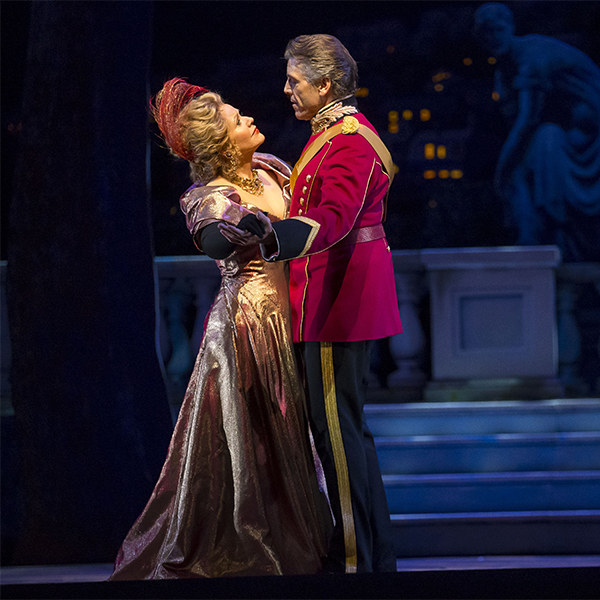
Renée Fleming as Hanna Glawari and Thomas Hampson as Count Danilo in Lyric's 2015/16 production of Franz Lehár's The Merry Widow.
Through thick and thin: Leonore and Florestan
In Beethoven's only opera—Fidelio—a couple is separated when Florestan, a Spanish nobleman, is falsely imprisoned by his rival Pizarro. Even as rumors of Florestan's death circulate, his wife Leonore never gives up hope that her love is alive. Taking the situation into her own hands, Leonore disguises herself as a boy named Fidelio and secures a job working for the prison warden. Just before Florestan is set to be executed by the opera's villain, Leonore throws herself in front of her husband, buying them time until the minister, Don Fernando, arrives and arrests Pizarro. Justice and love prevail!
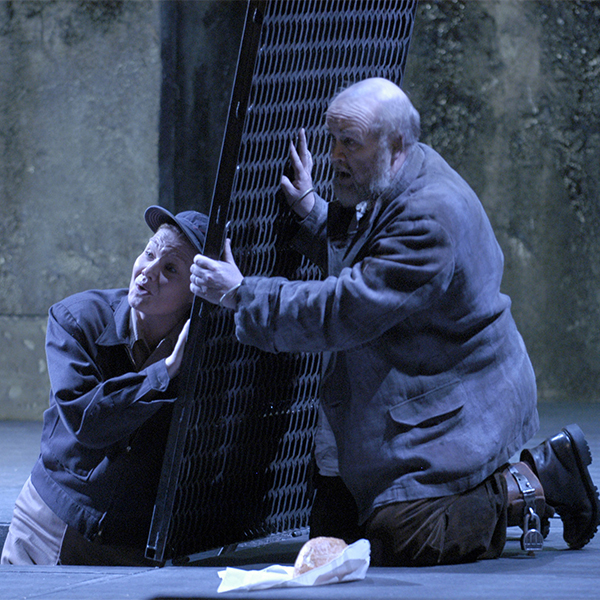
Karita Mattila as Leonore/Fidelio and Kim Begley as Florestan in Lyric's 2004/05 production of Beethoven's Fidelio.
Enemies to Lovers: Beatrice and Benedict
Berlioz's Béatrice et Bénédict is closely based on Shakespeare's comedy Much Ado About Nothing. From the moment they meet, the title characters are at odds and Benedict swears he will never marry Beatrice. However, when their friends decide to play a trick on the couple, telling Benedict that Beatrice loves him, he resolves to pursue her, not wanting her love to go unrequited. Similarly, Beatrice is told that Benedict secretly loves her. While at first they attempt to conceal their growing feelings, they ultimately declare their love and get married.
In this clip from Glyndebourne's 2016 production of Berlioz’s Béatrice et Bénédict, tenor Paul Appleby performs Benedict’s Act I aria “Ah! je vais l'aimer,” in which he convinces himself of Beatrice’s many fine qualities and decides to pursue her.
A love put to the test: Pamina and Tamino
It is love at first sight for Prince Tamino when he is given a portrait of the Queen of the Night's daughter, Pamina, who has been abducted. He sets off to rescue Pamina with his comical companion Papageno. Upon reaching Sarastro's temple, he realizes that the Queen may not be telling the whole truth. Willing to undergo multiple trials to be deemed worthy of Pamina's hand in marriage and enter Sarastro's brotherhood, Tamino remains patient, steadfast, and wise just as the guiding spirits instructed. Pamina joins him for the final trials and thanks to their love and the protective power of a magic flute, they pass through chambers of fire and water unscathed. Together they enter the Temple of the Sun as a new day dawns and light triumphs over darkness in Mozart's The Magic Flute.
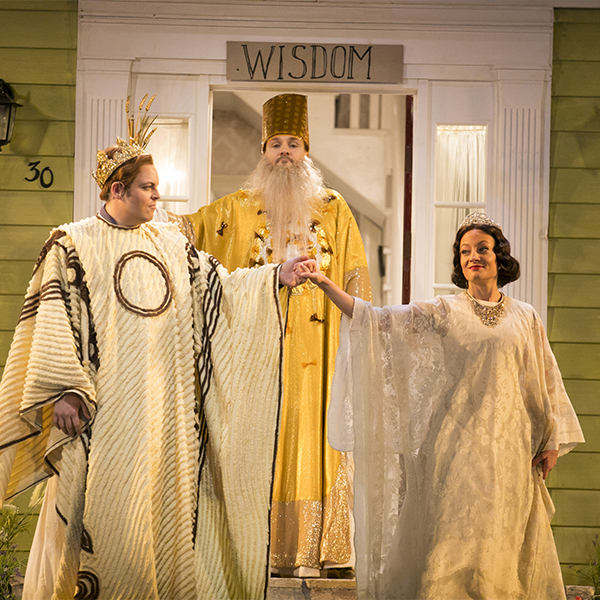
Andrew Staples as Tamino, Christof Fischesser as Sarastro, and Christiane Karg as Pamina in Lyric's 2016/17 production of Mozart's The Magic Flute.
A fairytale romance: Cinderella and Prince Charming
A disillusioned prince, a downtrodden servant girl, a love story that has been told time and time again. Like Rossini's La Cenerentola, Massenet's Cendrillon adds its own twists and turns to this storybook romance. Through the help of a Fairy Godmother, Cinderella meets Prince Charming at the ball and the couple instantly fall in love. In this opera, when the clock strikes midnight and Cinderella flees, leaving behind nothing but a glass slipper, the lovers are reunited later that evening in an enchanted forest. Drawn together by fairies, they sing of their love and fall into each other's arms. Months later, Cinderella wakes up at home and her father, Pandolfe, convinces her that the encounter in the forest was only a dream brought on by delirium. Then, a royal herald summons all the eligible princesses in the land to the King's palace to try on the glass slipper. Cinderella realizes that her dream was true and, proving the shoe a perfect fit, lives happily ever after with her Prince.
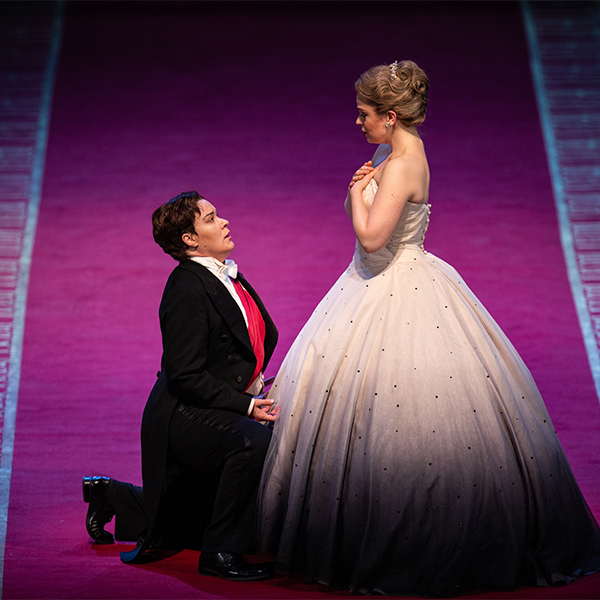
Alice Coote as Prince Charming and Siobhan Stagg as Lucette (Cinderella) in Lyric's 2018/19 production of Massenet's Cendrillon.
Love is blind: Vaudémont and Iolanta
Two couples get a happy ending in Tchaikovsky's Iolanta! Blind from birth, Princess Iolanta was never told of her disability, or that she is in fact a princess. Isolated from the world, she is promised in marriage to Duke Robert. When her betrothed arrives at the King's estate with his friend Count Vaudémont, he is instantly suspicious of Iolanta—believing her to be a sorceress who has trapped his friend under her spell. When he leaves to gather reinforcements, Iolanta and Vaudémont fall in love. He explains light and color to the princess before they are discovered by her father. Because she is now aware of her blindness, the King allows her to undergo treatment that could potentially restore her sight. Vaudémont pledges his love, regardless of whether she can see, and after Robert admits that he has fallen in love with another, the original wedding contract is voided. The treatment is a success and Iolanta is free to marry Vaudémont.
Anna Netrebko (Iolanta) and Piotr Beczala (Vaudémont) perform a scene from Tchaikovsky’s Iolanta in this clip from the Metropolitan Opera’s 2015 production.
A love that transcends death: Orpheus and Eurydice
While it's easy to poke fun at Orpheus for his inability to follow one simple rule (don't turn around), his love for Eurydice is undeniable. In Gluck's Orphée et Eurydice, he travels through the Underworld, facing Furies and fearsome sights to be reunited with his love. When he loses her once again, he is so distraught that he is willing to die because he believes that is the only way they can be together. As a reward for his unwavering love, Amour (Cupid) returns Eurydice to life, proving that true love can conquer anything—even death.
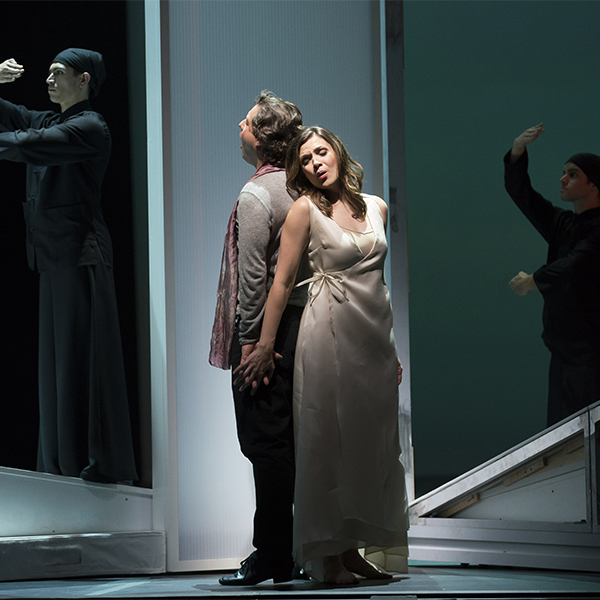
Dmitry Korchak as Orpheus and Andriana Chuchman as Eurydice in Lyric's 2017/18 production of Gluck's Orphée et Eurydice.
Love on the run: Minnie and Johnson
Some girls just love a bad boy, and Minnie from Puccini's La Fanciulla del West is one of them. When she meets Dick Johnson, she is instantly smitten, unaware that he is really a bandit on the run. When his true identity is discovered, Minnie confronts him and he swears to give up his life of crime. When Johnson is shot, he takes shelter with Minnie, but the sheriff, Jack Rance, discovers him. The desperate Minnie challenges Rance to a game of poker. She cheats, and wins the bandit a stay of execution. After Minnie nurses him back to health, Johnson is again on the run from the law, then headed for the gallows. Minnie rides in at the last minute, wielding a pistol, and bargains for Johnson's life. Free at last, Johnson and Minnie ride into the sunset to begin a new life together.
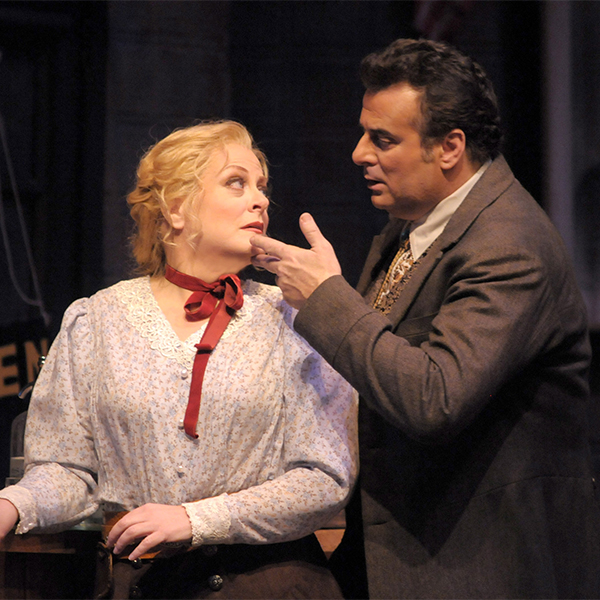
Deborah Voigt as Minnie and Marcello Giordani as Dick Johnson/Ramerrez in Lyric's 2010/11 production of Puccini's La fanciulla del West.
Mistaken identities, unmistakable love: Marie and Tonio
In Donizetti's comedic opera La Fille du Régiment, the title character, Marie, was raised by soldiers after being found on the battlefield as a baby. Tonio is a Tyrolean who saved her life while mountain climbing. The two quickly fall in love, but before they can marry, she tells Tonio he must get approval from her “fathers,” the soldiers of the regiment. He swears loyalty to France and joins their ranks. Meanwhile, Marie’s long-lost aunt (who is later revealed to actually be her mother) stumbles upon their camp and demands Marie accompany her to her castle so she can learn to be a proper lady. Once there, Marie is pressured to marry the Duke of Krakenthorp. Months go by before she is reunited with Tonio, now an officer. Thanks to the help of the regiment, Marie is able to avoid the arranged marriage and persuade her mother, the Marquise, to allow her to marry Tonio.
In this clip from Washington National Opera’s 2016 production of Donizetti’s La Fille du Régiment, Marie (Lisette Oropesa) and Tonio (Lawrence Brownlee) are told they can marry, and everyone celebrates.
A full-circle romance: Arturo and Elvira
In Bellini's I puritani, Elvira, a Puritan, falls in love with Arturo, a Royalist, and the two are set to marry despite an on-going Civil War. When Arturo is forced to flee after freeing the endangered Queen Henrietta (widow of the executed King Charles I), Elvira is driven to madness, thinking her love has run off with another woman. Arturo risks his life to return to Elvira, bringing her back to her senses. Just as he is about to be sentenced to death, Cromwell's victory is announced and all political prisoners are pardoned, clearing the way for Arturo and Elvira to marry after all.
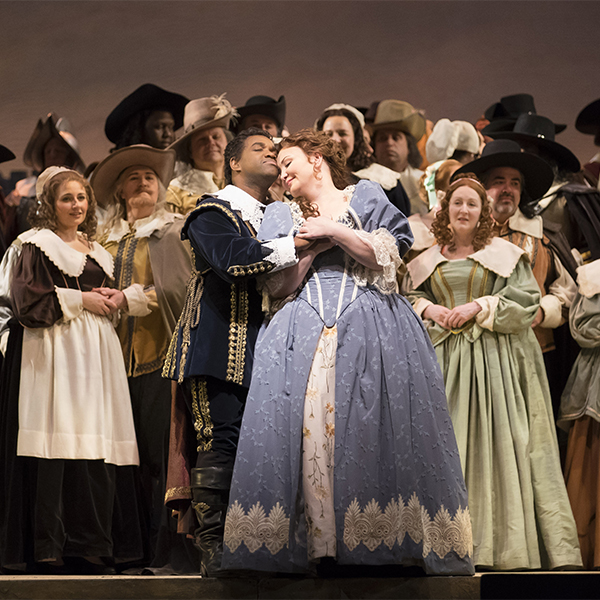
Lawrence Brownlee and Arturo and Albina Shagimuratova as Elvira in Lyric's 2017/18 production of Bellini's I puritani.
